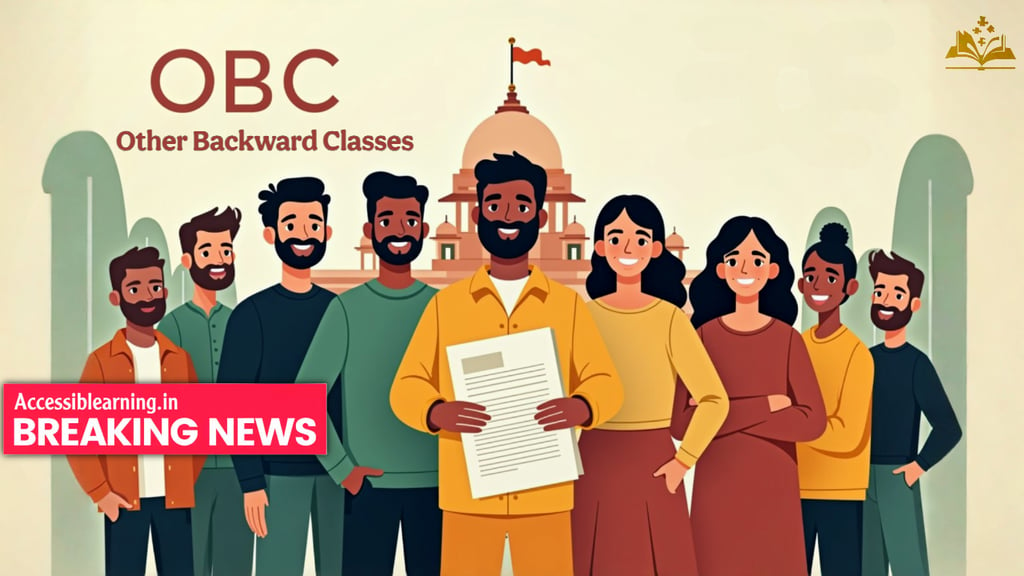
OBC Welfare Report 2025: Parliamentary Committee Submits Findings to 18th Lok Sabha
The Parliamentary Committee on Welfare of Other Backward Classes (OBCs) submits its detailed report to the 18th Lok Sabha, addressing education, employment, caste census, and inclusive growth. A major step toward social justice and equity in India.
NEWS/CURRENT AFFAIRSMODERN INDIAEDUCATION/KNOWLEDGENEPOTISM/SOCIAL ISSUES
Keshav Jha
4/6/20254 min read


In a landmark development, the Parliamentary Committee on Welfare of Other Backward Classes (OBCs) has submitted a comprehensive report to the Eighteenth Lok Sabha, marking a decisive moment in India's pursuit of social justice and equitable development. This report is not merely a formality—it is a strategic reflection of the government’s commitment to uplift a historically marginalized yet demographically significant segment of society.
Let’s explore the in-depth highlights of the report, its socio-political context, key statistics, and what this means for India’s long-term development.
The Committee’s Purpose and Background
The Committee on the Welfare of OBCs is a Parliamentary Standing Committee established to ensure effective implementation of schemes, laws, and constitutional safeguards meant for Other Backward Classes. While various ministries oversee OBC-centric programs, this committee plays a watchdog role, bringing cross-party oversight and accountability into the system.
Mandate Highlights:
Monitor reservation policy implementation in central government jobs, universities, and PSUs.
Evaluate the efficacy of welfare schemes for education, health, and entrepreneurship.
Recommend course corrections and identify gaps in policy execution.
Key Demographic Insights: Why OBC Welfare Matters
According to the Socio-Economic Caste Census (SECC) 2011, OBCs account for approximately 42–45% of India's population. Despite this vast share, representation and access to resources have remained limited:
Only around 20% of OBCs complete higher secondary education.
In central government jobs, OBC representation hovers around 22%, despite a 27% reservation quota.
Rural OBC households face higher levels of multi-dimensional poverty than the national average.
This under-representation and deprivation are what the committee aims to rectify through structured reforms and policy recommendations.
Key Areas Covered in the Report and Strategic Recommendations
Reimagining Education for OBCs
While reservation exists in higher education, the committee emphasized the need for qualitative and infrastructural reforms to bridge the learning gap.
Recommendations include:
Establish residential OBC hostels in backward districts.
Free online coaching for competitive exams like UPSC, JEE, NEET, etc.
Dedicated career counseling cells in universities to help OBC students navigate opportunities.
Employment Equity Beyond Reservation
Although government job reservations exist, the report criticizes "backlog vacancies" that remain unfilled, affecting representation.
Actionable Suggestions:
Periodic audits of OBC recruitment in central ministries and PSUs.
Encouragement for private sector reservation through voluntary affirmative action.
Enhancing awareness about entrepreneurship schemes, like Stand-Up India and PMEGP, tailored for OBCs.
Caste Census for Evidence-Based Policy
The committee strongly backed the demand for a nationwide caste census, stating that accurate, updated data is essential to ensure targeted delivery of benefits.
This echoes the sentiments of many states like Bihar, which recently conducted a caste-based survey to understand population distribution and resource allocation better.
Health, Housing, and Welfare
Social indicators reveal that OBCs have lower access to healthcare insurance, nutritional schemes, and urban housing programs.
Recommendations include:
Special sub-quotas within housing and health insurance schemes.
Mobile health clinics in OBC-dominated rural belts.
Skill-based employment drives are linked with Ayushman Bharat, PMAY, and the National Digital Health Mission.
Political Representation and Voice
The report points out the under-representation of OBCs in higher echelons of policymaking, despite their numerical strength.
Suggestions:
Implementation of OBC political reservations in Parliament and State Assemblies (a long-debated issue).
Political party mandates for ticket distribution to OBC candidates.
Leadership development programs for young OBC politicians and activists.
Comparative Global Context: Affirmative Action Elsewhere
The report also drew attention to international parallels. Countries like:
Brazil implement racial quotas in universities and public jobs.
USA uses affirmative action for minority inclusion in education and employment.
India’s approach must evolve from quota-centric to holistic empowerment, the report emphasized.
The Legal and Constitutional Framework
Several Supreme Court judgments and constitutional provisions back the committee's work:
Article 15(4) and 16(4): Enable the state to provide special provisions for socially and educationally backward classes.
Indra Sawhney Judgment (1992): Capped reservations at 50%; laid the foundation for the creamy layer concept.
102nd and 105th Constitutional Amendments: Gave the National Commission for Backward Classes (NCBC) constitutional status and clarified state powers in identifying OBCs.
The report calls for dynamic legal frameworks to match the changing aspirations and demographics of the OBC community.
Immediate Government Response & Next Steps
After receiving the report, the Ministry of Social Justice and Empowerment acknowledged the importance of the findings and promised to:
Review the implementation of existing schemes.
Consult state governments on proposed policy changes.
Integrate suggestions into the Annual Budget Planning for social sectors.
Additionally, the Lok Sabha Speaker has assured that the report will be tabled for wider parliamentary debate, giving it the momentum it deserves.
Voices from the Ground: Reactions to the Report
Civil society organizations and OBC advocacy groups welcomed the report, especially its push for a caste census and inclusive education.
Dr. L. Hanumanthaiah, Chairperson of the Committee (Rajya Sabha MP), stated, "We aim not just for representation but for empowerment through dignity, access, and opportunity."
Activists called the report a "moral and administrative wake-up call" to address systemic exclusion.
The submission of the Parliamentary Committee on the Welfare of OBCs’ report to the Eighteenth Lok Sabha is a pivotal moment for India's governance. It blends empathy with strategy, data with advocacy, and tradition with transformation. While its recommendations offer a robust framework for inclusive growth, true success will depend on implementation, political will, and continuous monitoring.
As India walks toward becoming a $5 trillion economy and a digitally empowered society, no community can be left behind—and this report reaffirms that OBC welfare is not a choice but a necessity for national progress.
Subscribe to our newsletter
All © Copyright reserved by Accessible-Learning
| Terms & Conditions
Knowledge is power. Learn with Us. 📚


